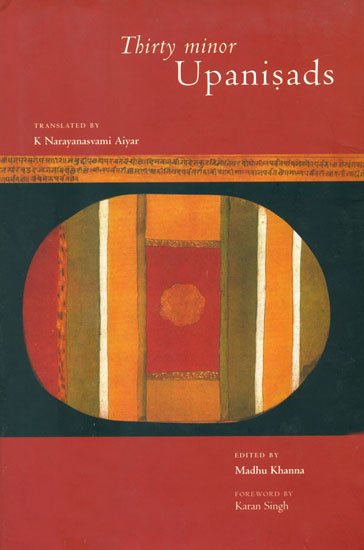Thirty minor Upanishads
by K. Narayanasvami Aiyar | 1914 | 95,228 words
This book contains the English translation of thirty minor Upanishads.—Fourteen belonging to Vedanta, two are categorised as Physiological, three are Mantra, two are Sannyasa and the remaining nine are categorised as Yoga-Upanishads. These Upanishads are properly defined as the Aranya-portion of the Vedas (most ancient Hindu scriptures) and are so-...
Mandala-brahmana Upanishad of Shukla-Yajurveda, Chapter III
The great sage Yājñavalkya then asked the Puruṣa in the sphere (of the sun): "O Lord, though the nature of amanaska has been defined (by you), yet I forget it (or do not understand it clearly). Therefore pray explain it again to me." Accordingly the Puruṣa said: "This amanaska is a great secret. By knowing this, one becomes a person who has done his duty. One should look upon it as Paramātmā, associated with Śāmbhavīmudrā and should know also all those that can be known through a (thorough) cognition of them. Then seeing Parabrahman in his own Ātma as the Lord of all, the immeasurable, the birthless, the auspicious, the supreme ākāś, the supportless, the secondless the only goal of Brahma, Viṣṇu and Rudra and the cause of all and assuring himself that he who plays in the cave (of the heart) is such a one, he should raise himself above the dualities of existence and non-existence; and knowing the experience of the unmanī of his manas, he then attains the state of Parabrahman which is motionless as a lamp in a windless place, having reached the ocean of brāhmic bliss by means of the river of amanaska-yoga through the destruction of all his senses. Then he resembles a dry tree. Having lost all (idea of) the universe through the disappearance of growth, sleep, disease, expiration and inspiration, his body being always steady, he comes to have a supreme quiescence, being devoid of the movements of his manas and becomes absorbed in Paramātma. The destruction of manas takes place after the destruction of the collective senses, like the cow's udder (that shrivels up) after the milk has been drawn. It is this that is amanaska. By following this, one becomes always pure and becomes one that has done his duty, having been filled with the partless bliss by means of the path of tāraka-yoga through the initiation into the sacred sentences 'I am Paramātmā,' 'That art thou,' 'I am thou alone,' 'Thou art I alone,' etc.
"When his manas is immersed in the ākāś and he becomes all-full, and when he attains the unmanī state, having abandoned all his collective senses, he conquers all sorrows and impurities through the partless bliss, having attained the fruits of kaivalya, ripened through the collective merits gathered in all his previous lives and thinking always 'I am Brahman,' becomes one that has done his duty. 'I am thou alone. There is no difference between thee and me owing to the fullness of Paramātmā.' Saying thus, he (the Puruṣa of the sun) embraced his pupil[1] and made him understand it.
"Thus ends the third Brāhmaṇa."
